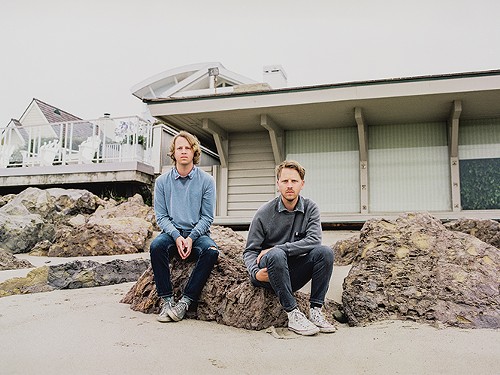Cayucas
Cayucas' sunny sounds toe the line between fantasy and heartache
By Kimball Bennion @KimballBennionEven if you don't know that Cayucas' name comes from a sleepy beachside town on the Pacific Coast, it's not hard to tell where they're from.
Led by singer and principal songwriter Zach Yudin and his twin brother, guitarist and bassist Ben Yudin, Cayucas exports easy California surf vibes in a way that quickly draws parallels to that other fraternal group whose musical compass always pointed west. "I think we try to channel California," Zach says. "It worked for the Beach Boys, so why not, right?"
But being a band that identifies as closely with California as the Beach Boys did comes with a price. There is perhaps no other place in the atlas of popular music that comes with such mythical expectations, and the burden on bands from the Golden State to personify that ideal can be an unexpectedly heavy one.
So as sunny and light as the band's newest record Dancing at the Blue Lagoon (Secretly Canadian) may sound, it is not surprising that there's also a subtle ache within its songs of glamorous Jacuzzi nights and sunny suburban days. (Interestingly, the record was actually recorded in rainy Seattle.)
Part of that ache comes from the nostalgia that Blue Lagoon evokes, which Zach says mostly stemmed from childhood experiences. "It's all personal, but not necessarily emotional," Zach explains. "It's not about heartbreak or falling in love—the more typical themes. It's the stories that don't get told, really. I don't write about my prom night; I write about the night before."
The Yudins have been through a whirlwind in the past couple of years. Cayucas started as a series of home recordings Zach made in his bedroom under the moniker Oregon Bike Trails, which quickly evolved into Cayucas' 2013 debut Bigfoot (Secretly Canadian), which spawned the respectable alt radio hits "Cayucos" and "High School Lover," along with a grueling world tour.
However, Zach says he resisted the temptation to use those experiences as the basis for the band's follow-up. Instead, he channels a paradise that exists in his mind.
"Everything draws from real life," Zach says. "That's the starting point. Then I go from there and like to get creative, whether it's fact or fiction. ... But it all starts from a real place."
Zach explores some of that reality in the song "Champion," where he sings about the tension between self-doubt and dreaming, using snippets of memories of his hometown in Davis, Calif.: "As dreamers do, I did believe that fate would be kind to my foolishness/ Put the tape in the VCR, go to Channel 3."
"When I was young, I would dream about things, and a lot of that was based around TV and movies," Zach explains, in regard to the song.
But even at its soaring chorus, its promise of realized dreams is conditional: "You could be a champion ... if only for a night/ Feel your feet lift off of the pavement/ Above the two-story houses you've taken flight."
Much of Blue Lagoon finds itself in that tenuous space between dreams and heartache. Even a song like "Backstroke"—an electronic-tinged time machine to a "Jacuzzi night" at the "Chateau de la Queen near the border of Paraguay"—doesn't let the listener escape into its fantasy of "white suit jackets" and "copper-tinted ashtrays" for long.
"Sometimes you fantasize being drenched in the yellows and Tahitian blues/ Salty water slaps into your ears/ Lips puckered up, girl, and you hear nothing at all." Zach sings.
"Lyrically, I think [this record] is a little bit deeper, maybe more personal, but in the same vein," Zach says. "We did realize that maybe we should write songs that would be fun to play live."
The back-to-back romps "Moony Eyed Walrus" and "Hella" seem to fit that description nicely. Both are sunny and danceable, and they carry a familiar sound. Critics have sometimes accused Zach of cribbing guitar styles and rhythms popularized by Vampire Weekend, and while he doesn't dispute that Vampire Weekend's East Coast elite sound is a major influence, his inspiration always seems to carry him back West.
The jangly guitar on "Moony Eyed Walrus," for example, owes more to Dick Dale than Vampire Weekend's Ezra Koenig. Besides, Blue Lagoon's overall sound seems to draw back further than just the mid-2000s. Zach says a major influence on the record was Joe Meek, the '60s British record producer whose production of The Tornados' spacey hit "Telstar" has its own sunny qualities.
Still, Zach says he is flattered to be mentioned in the same breath as one of his influences.
"You just have to embrace it," he says. "It's hard to forge a musical path with only one album, now two. ... We're still looking for that sweet spot."
More by Kimball Bennion
-
It Was 50 Years Ago Today
One of the artists behind the Beatles' Sgt. Pepper album cover prefers to look forward.
- May 31, 2017
-
Live Music Picks: April 13-19
Real Estate, DJ Quik, Brant Bjork, Nellie McKay and more.
- Apr 12, 2017
-
Rising Son
Horn funk band Analog Son collabs with their idols on Black Diamond.
- Jan 18, 2017
- More »
Latest in Music
Readers also liked…
-
The Alpines Head North
Local band's debut concept album finds musical bliss in the apocalypse.
- Feb 7, 2024



